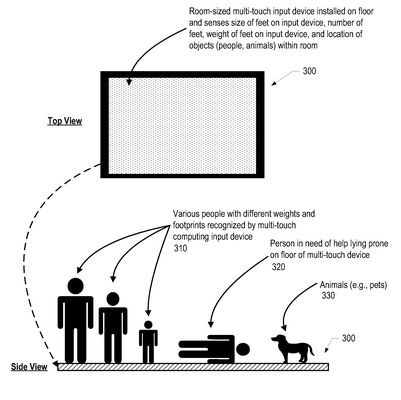A Multitouch Floor May Someday Detect Your Heart Attack

A future smart home will need a way to sense who its residents are and what they're doing. One way to do so may be through the floor.
The U.S. Patent and Trademark Office recently granted a patent to IBM for a security system that would turn a floor into a multitouch surface that recognizes who's standing on it. The floor senses different shapes and weights, so it would know the difference between adults, children and pets by weight and shape and number of feet on the floor. It has a database of registered identities to which it could match the shapes and weights it detects. Once it senses an unauthorized person standing on it, it can sound alarms or call the police, just like traditional house alarms. IBM received the patent, No. 8,138,882, on March 20.
With the home security systems people have today, they can accidentally trip their own alarms if they forget to disarm them when they come home, IBM researchers wrote in their patent proposal. The new idea ensures that as long as people are registered in the system as an authorized person, they'll never trip their own security system. In fact, if the floor senses registered residents are home, it can turn on lights or unlock doors for them.
Besides monitoring unauthorized burglars from the outside, the floors are made to help the authorized people inside monitor each other, too. Because it knows the identities of everyone's feet, it can let a resident know when her spouse comes home. It might alert adults if a toddler wanders too near the pool or hot tub, or sound a high-pitched alarm if Fido sneaks into a room that's forbidden to him.
It could recognize if someone were lying down on the floor, indicating she might be ill. A heartbeat sensor then checks her pulse. If she's in trouble, the system can call a caretaker or 911.
Beyond knowing who's in the room, the system also knows how to count how many people and animals there are. Users could program in an action if the floor detects more people than a certain threshold number. In their patent proposal, the researchers suggested parents get a phone call if there are more than six people in the house while they're away, indicating their kid is throwing a party.
The company's long-term plans for the idea, if any, are unclear. "The newly-patented invention is not part of a product or solution and we can't speculate about if or how it will be implemented," IBM spokesman Christopher Andrews wrote to InnovationNewsDaily in an email. He declined to answer how far along researchers are in creating the system and how often IBM actually uses its granted patents. But because the description sounds as if it may be an essential piece to a smarter future home, people may see more of this patent in the coming years.
Sign up for the Live Science daily newsletter now
Get the world’s most fascinating discoveries delivered straight to your inbox.
This story was provided by InnovationNewsDaily, a sister site to LiveScience. You can follow InnovationNewsDaily staff writer Francie Diep on Twitter @franciediep. Follow InnovationNewsDaily on Twitter @News_Innovation, or on Facebook.











